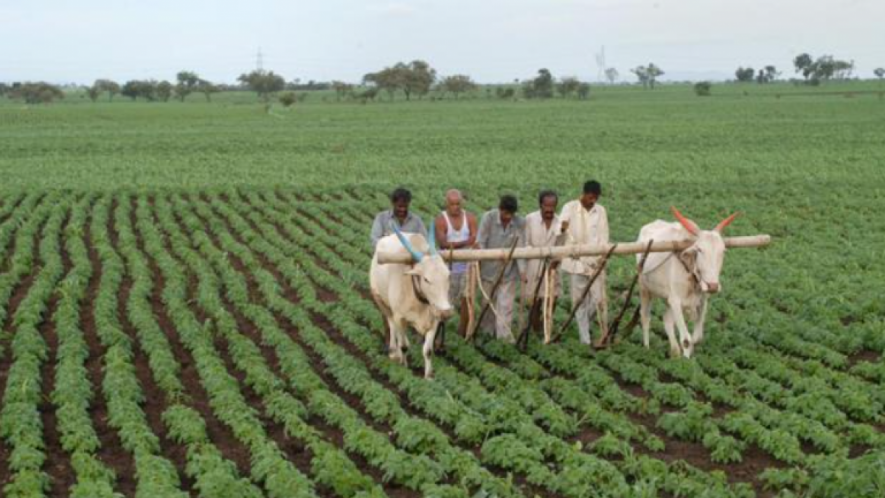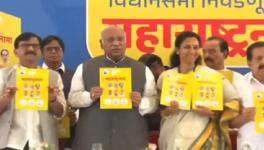AIKS Says Maharashtra Govt's Farm Bills Similar to Central Laws with 'Minor Changes'

Representational Image.
The Maharashtra government has presented three farm bills in the legislative assembly and these are supposed to be reworked versions of the three contentious central farm laws. While there have been unprecedented protests at the borders of Delhi for scrapping the central farm laws, the Maharashtra government had publicly opposed the laws and said those would not be implemented in the state. So, the Maha Vikas Aghadi (MVA) government has come up with new amendments, which are supposed to be pro-farmers. However, the All India Kisan Sabha (AIKS) thinks otherwise.
The AIKS leaders have gone through the MVA government's bills in detail. Dr Ajit Navale, general secretary of Maharashtra AIKS, pointed out the loopholes and the intent of the state government behind bringing the bills. He said the MVA farm bills had "a minor change" which "do not alter the character of Modi sarkar's bills." While welcoming the provision for public deliberation and discussion over bills, Dr Navale raised a question over whether the bills were "intended to change the fortune of farmers or trying to bring pro crony capitalists laws through backdoor entry". Here are excerpts from Dr Navale's interview with NewsClick.
You must have gone through the three bills presented by the Maharashtra government in the monsoon session of the Assembly. What is your impression of them?
Dr Navale: Yes, we have read it and discussed the bills for two days. We have discussed it with many farmers, legal experts and also activists across the spectrum. The first reaction is that these bills will prove an attempt to bring the Modi government's anti-farming laws in Maharashtra through the backdoor entry. It won't change the scene for improvement. But right now, we welcome the position of the MVA that these bills are open for discussion and deliberations. We will definitely give our objections to the legislative assembly and also meet all leaders of MVA to show the loopholes in the bills.
So, does it mean that you are not satisfied with the MVA bills in their current form?
Dr Navale: Not at all. We have multiple objections about all three bills.
In that case, let's start with the key issue of minimum support price (MSP). What are your objections to it?
Dr Navale: We have gone through the bills of the Modi government. Those bills did not give protection of MSP to farmers. What is the situation of MSP in MVA bills? It says in the first line that the agreement between the trader and the farmer must be based on equal to MSP or above MSP. So, one would get the impression that the MVA has protected the MSP system. But the very second line of the same bill states that, if the agreement between the farmer and the trader is of a period less than two years, then they can have it below MSP. Why? Isn't it a way out for crony capitalists and traders to control the prices of agricultural produces? So, this is conspicuous. They will have to change it.
As per Maharashtra APMC Act 1963, article 29 - 1 - IX, APMCs are supposed to protect farmers with MSP. But they never do that. The state government should have come up with amendments to this law, make it stricter and protect the farmers. Instead of doing that, the state government paid just lip service to MSP in the bills. This does not change what the Modi government intends to do with their laws.
There is opposition to the central farm laws for multiple reasons. One is about how these laws will damage the APMCs in the country. Do you see anything against APMCs in the MVA bills?
Dr Navale: No, I don't see it. But APMCs need to be strengthened and protected. What is our objection to the Modi government laws? That allowing traders to do business out of APMCs means it will harm APMCs. It will result in less income for the APMCs. In time, these APMCs will collapse as they won't have income. In the state bills, there is nothing to protect APMCs from these provisions. It means the state leaders don't want to improve APMCs either.
There is a provision about essential commodities that in times of famine, earthquake or any natural calamities or an emergency situation, the state would take control of the supply and distribution of grains and pulses. How do you see it?
Dr Navale: It is true that there is no such provision in the centre's bills. So, it could lead to the stocking of grains and black marketing. But here is the glitch; we need to understand that till now such rights have been with the central government only. If every state starts taking it into their hands then there will be a mess. There should be a unanimous and proper provision in the laws regarding it.
There is also a provision of punishment for cheating traders in the Maharashtra government laws. Are you satisfied with it?
Dr Navale: Yes, it is good. It will instil fear of law in traders so that they won't cheat farmers. We welcome this provision.
It seems that you have serious objections to the MVA laws. How will you convince the state government to amend it further?
Dr Navale: Right now, we are giving our objections in writing to the secretariat of the legislative house. They have made a public appeal to submit the objections. So, we will do it. At the same time, our parent body AIKSCC will meet all the senior leaders of the MVA and submit our objections. We will unitedly create pressure on the state government. We are also planning to meet prominent MLAs and MLCs to brief them about our objections. We are sure that after listening to us, the state government will have to amend the proposed bills.
Get the latest reports & analysis with people's perspective on Protests, movements & deep analytical videos, discussions of the current affairs in your Telegram app. Subscribe to NewsClick's Telegram channel & get Real-Time updates on stories, as they get published on our website.
























